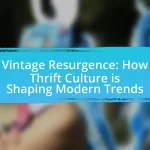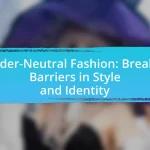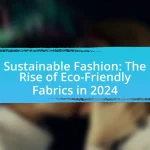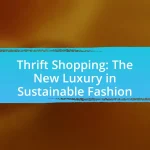The article focuses on ethical fashion, which emphasizes social and environmental responsibility in clothing and accessory production. It highlights the importance of sustainability, fair labor practices, and transparency, contrasting ethical fashion with traditional fast fashion that often prioritizes profit over ethical considerations. Key principles of ethical fashion include minimizing environmental impact and ensuring fair treatment of workers. The article also discusses the challenges faced by the ethical fashion industry, the influence of consumer perceptions, and the economic implications for brands adopting ethical practices. Leading brands such as Patagonia, Eileen Fisher, and Stella McCartney are examined for their innovative approaches to sustainability and community engagement, while the future of ethical fashion is explored in terms of consumer demand, technological advancements, and legislative impacts.

What is Ethical Fashion and Why is it Important?
Ethical fashion refers to clothing and accessories produced in a manner that prioritizes social and environmental responsibility. This approach is important because it addresses issues such as labor rights, environmental sustainability, and animal welfare, promoting fair treatment of workers and reducing the negative impact of fashion on the planet. For instance, the global fashion industry is responsible for approximately 10% of annual carbon emissions, highlighting the urgent need for sustainable practices. By supporting ethical fashion, consumers can contribute to a more equitable and sustainable future, influencing brands to adopt responsible practices.
How does ethical fashion differ from traditional fashion?
Ethical fashion differs from traditional fashion primarily in its commitment to sustainability and social responsibility. While traditional fashion often prioritizes profit and rapid production, ethical fashion emphasizes fair labor practices, environmentally friendly materials, and transparency in the supply chain. For instance, ethical brands like Patagonia and Everlane focus on using organic materials and ensuring fair wages for workers, contrasting with traditional brands that may exploit labor and prioritize cost-cutting over ethical considerations. This distinction highlights a growing consumer demand for accountability and sustainability in the fashion industry.
What are the key principles of ethical fashion?
The key principles of ethical fashion include sustainability, fair labor practices, and transparency. Sustainability focuses on minimizing environmental impact through eco-friendly materials and production processes. Fair labor practices ensure that workers receive fair wages, safe working conditions, and respect for their rights. Transparency involves brands openly sharing their supply chain practices and sourcing information, allowing consumers to make informed choices. These principles are supported by various studies, such as the 2020 Fashion Transparency Index, which highlights the importance of accountability in the fashion industry.
Why is sustainability a core component of ethical fashion?
Sustainability is a core component of ethical fashion because it addresses the environmental and social impacts of clothing production. Ethical fashion prioritizes sustainable practices to minimize waste, reduce carbon footprints, and ensure fair labor conditions. For instance, the fashion industry is responsible for approximately 10% of global carbon emissions, highlighting the urgent need for sustainable approaches. Brands that adopt sustainable materials and production methods contribute to a circular economy, which reduces resource depletion and promotes environmental stewardship. This commitment to sustainability not only aligns with consumer demand for responsible practices but also fosters long-term viability for the fashion industry.
What challenges does the ethical fashion industry face?
The ethical fashion industry faces significant challenges, including high production costs, consumer awareness, and supply chain transparency. High production costs arise from the use of sustainable materials and fair labor practices, which can lead to higher retail prices compared to fast fashion. Consumer awareness is another challenge, as many shoppers remain uninformed about the environmental and social impacts of their purchases, making it difficult for ethical brands to compete. Additionally, supply chain transparency is crucial; ethical fashion brands often struggle to ensure that every part of their supply chain adheres to ethical standards, which can lead to potential reputational risks. These challenges hinder the growth and acceptance of ethical fashion in a market dominated by cheaper, less sustainable alternatives.
How do consumer perceptions impact ethical fashion brands?
Consumer perceptions significantly impact ethical fashion brands by influencing purchasing decisions and brand loyalty. When consumers view ethical fashion positively, they are more likely to support brands that prioritize sustainability and fair labor practices, leading to increased sales and market share. For instance, a 2021 survey by McKinsey & Company found that 67% of consumers consider sustainability when making a purchase, indicating a strong correlation between consumer attitudes and brand performance in the ethical fashion sector. Additionally, negative perceptions, such as skepticism about a brand’s authenticity or transparency, can deter consumers, resulting in decreased trust and sales. Thus, consumer perceptions directly shape the success and growth of ethical fashion brands.
What are the economic implications for brands adopting ethical practices?
Brands adopting ethical practices can experience positive economic implications, including increased consumer loyalty and enhanced brand reputation. Research indicates that 66% of global consumers are willing to pay more for sustainable brands, demonstrating a clear market preference for ethical practices. Additionally, companies that prioritize ethical standards often see reduced operational risks and improved employee satisfaction, which can lead to higher productivity and lower turnover costs. For instance, a study by Nielsen found that brands with strong sustainability commitments outperform their competitors in sales growth, reinforcing the economic benefits of ethical practices.

Which Brands are Leading the Charge in Ethical Fashion?
Patagonia, Eileen Fisher, and Stella McCartney are leading the charge in ethical fashion. Patagonia is renowned for its commitment to environmental sustainability, using recycled materials and promoting fair labor practices. Eileen Fisher emphasizes transparency in its supply chain and focuses on organic and sustainable fabrics. Stella McCartney is a pioneer in luxury ethical fashion, advocating for cruelty-free practices and sustainable sourcing. These brands exemplify the shift towards responsible production and consumption in the fashion industry.
What are some notable examples of ethical fashion brands?
Notable examples of ethical fashion brands include Patagonia, Everlane, and Reformation. Patagonia is recognized for its commitment to environmental sustainability and fair labor practices, often using recycled materials in its products. Everlane emphasizes transparency in its pricing and sourcing, providing consumers with detailed information about the factories where its clothing is made. Reformation focuses on sustainable practices and aims to minimize its environmental impact through eco-friendly materials and processes. These brands exemplify the principles of ethical fashion by prioritizing social responsibility and environmental stewardship.
How do these brands implement sustainable practices?
Brands implement sustainable practices by adopting eco-friendly materials, reducing waste, and promoting ethical labor practices. For instance, many brands utilize organic cotton, recycled polyester, and other sustainable fabrics to minimize environmental impact. Additionally, they often implement circular economy principles, such as take-back programs and recycling initiatives, to reduce waste. Furthermore, brands may ensure fair labor conditions by adhering to ethical sourcing standards and certifications, such as Fair Trade or GOTS (Global Organic Textile Standard), which verify their commitment to social responsibility. These practices collectively contribute to a more sustainable fashion industry.
What unique approaches do these brands take to promote ethical fashion?
Brands promoting ethical fashion often utilize transparency in their supply chains as a unique approach, allowing consumers to trace the origins of their products. For instance, companies like Everlane provide detailed information about their factories and production processes, which fosters trust and accountability. Additionally, many brands, such as Patagonia, engage in activism and environmental initiatives, reinforcing their commitment to sustainability through campaigns that advocate for climate action. Furthermore, some brands adopt circular fashion models, like Reformation, which focus on recycling and upcycling materials to minimize waste. These strategies not only differentiate these brands in the market but also align with the growing consumer demand for responsible and ethical practices in fashion.
How do these brands influence the broader fashion industry?
These brands influence the broader fashion industry by setting new standards for sustainability and ethical practices. For instance, companies like Patagonia and Stella McCartney have pioneered eco-friendly materials and transparent supply chains, prompting other brands to adopt similar practices. According to a 2021 report by McKinsey & Company, 67% of consumers consider sustainability when making fashion purchases, indicating a shift in consumer demand that these brands have helped to cultivate. This shift pressures the entire industry to prioritize ethical considerations, thereby reshaping production methods and marketing strategies across the sector.
What role do collaborations play in promoting ethical fashion?
Collaborations play a crucial role in promoting ethical fashion by combining resources, expertise, and influence from multiple stakeholders to drive sustainable practices. These partnerships often involve brands, non-profits, and artisans, which can amplify the reach and impact of ethical initiatives. For instance, collaborations between established fashion brands and sustainable material suppliers can lead to innovative products that prioritize environmental responsibility. Additionally, joint campaigns can raise awareness about ethical issues in the fashion industry, as seen in initiatives like the Fashion Revolution movement, which encourages transparency and accountability among brands. Such collaborations not only enhance brand credibility but also foster a community committed to ethical practices, ultimately contributing to a more sustainable fashion ecosystem.
How do these brands engage with their communities and consumers?
Brands in the ethical fashion sector engage with their communities and consumers through transparent communication, sustainable practices, and active participation in social causes. For instance, many brands utilize social media platforms to share their sustainability efforts, allowing consumers to see the impact of their purchases. Additionally, brands often collaborate with local artisans and communities, fostering economic growth and cultural exchange. Research indicates that 66% of consumers are willing to pay more for sustainable brands, highlighting the importance of ethical engagement in consumer decision-making. This engagement not only builds brand loyalty but also encourages a community-focused approach to fashion.
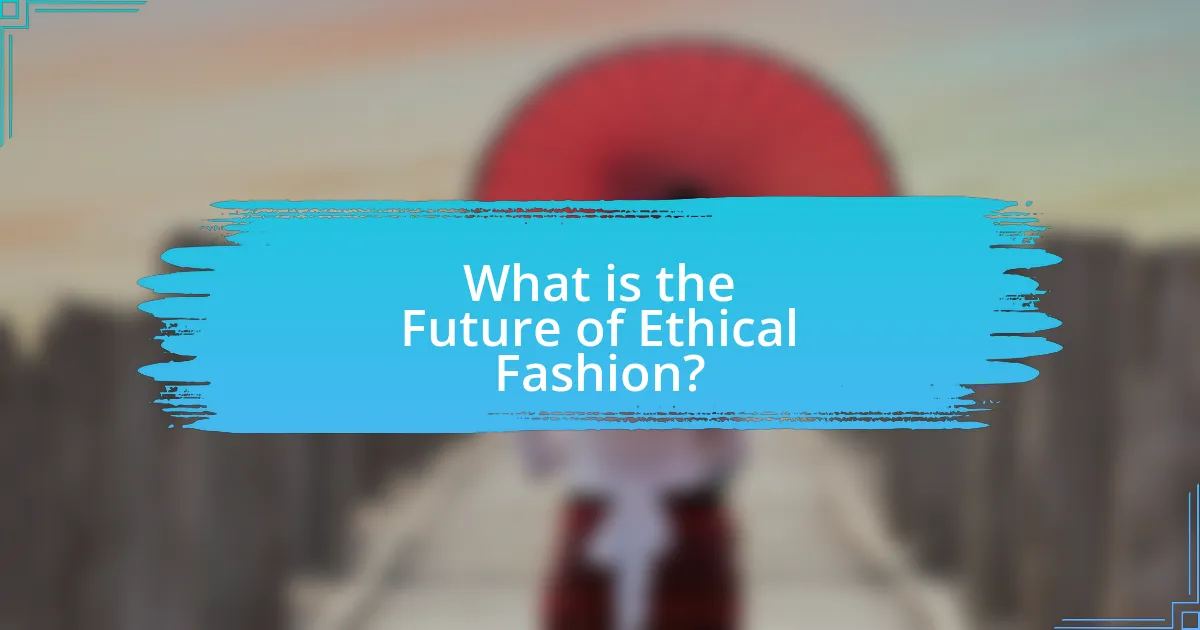
What is the Future of Ethical Fashion?
The future of ethical fashion is characterized by increased consumer demand for sustainability, transparency, and social responsibility. As consumers become more aware of the environmental and social impacts of their purchases, brands are responding by adopting sustainable practices, such as using eco-friendly materials and ensuring fair labor conditions. According to a 2021 McKinsey report, 67% of consumers consider sustainability when making a purchase, indicating a significant shift towards ethical consumption. This trend is further supported by the rise of certifications and standards, such as Fair Trade and Global Organic Textile Standard, which help consumers identify responsible brands. As a result, the ethical fashion sector is expected to grow, with more brands prioritizing ethical practices to meet consumer expectations and regulatory pressures.
How is technology shaping the future of ethical fashion?
Technology is shaping the future of ethical fashion by enabling transparency, sustainability, and efficiency in the supply chain. Innovations such as blockchain technology allow brands to trace the origin of materials, ensuring ethical sourcing and reducing the risk of exploitation. For instance, companies like Everledger utilize blockchain to provide verifiable records of a product’s journey, enhancing consumer trust. Additionally, advancements in materials science, such as the development of biodegradable fabrics and recycled materials, contribute to reducing environmental impact. According to a report by McKinsey & Company, the integration of technology in fashion can reduce waste by up to 30%, demonstrating its potential to foster a more sustainable industry.
What innovations are emerging in sustainable materials?
Innovations in sustainable materials include the development of bio-based textiles, such as those made from organic cotton, hemp, and recycled plastics. These materials reduce reliance on fossil fuels and minimize environmental impact. For instance, companies are increasingly using mycelium, the root structure of mushrooms, to create leather alternatives, which significantly lowers carbon emissions compared to traditional leather production. Additionally, advancements in textile recycling technologies enable the transformation of post-consumer waste into new fabrics, promoting a circular economy. According to a report by the Ellen MacArthur Foundation, transitioning to a circular fashion system could reduce greenhouse gas emissions by 44% by 2030.
How can digital platforms enhance transparency in the fashion supply chain?
Digital platforms can enhance transparency in the fashion supply chain by providing real-time tracking and data sharing capabilities. These platforms enable brands to disclose information about sourcing, production processes, and labor conditions, allowing consumers to access detailed insights into the origins of their products. For instance, blockchain technology is increasingly used to create immutable records of each step in the supply chain, ensuring that claims about sustainability and ethical practices can be verified. A study by McKinsey & Company highlights that 66% of consumers are willing to pay more for sustainable brands, indicating that transparency can drive consumer trust and loyalty.
What trends are expected to influence ethical fashion in the coming years?
Sustainability, transparency, and circularity are key trends expected to influence ethical fashion in the coming years. The increasing consumer demand for environmentally friendly practices is driving brands to adopt sustainable materials and production methods. For instance, a 2021 McKinsey report highlighted that 67% of consumers consider sustainability when making a purchase, indicating a significant shift towards eco-conscious buying behavior. Additionally, transparency in supply chains is becoming crucial, as consumers seek to understand the origins of their clothing. Brands that provide clear information about their sourcing and labor practices are likely to gain a competitive edge. Lastly, the concept of circular fashion, which emphasizes recycling and reusing materials, is gaining traction, with initiatives like the Ellen MacArthur Foundation’s Circular Fibres Initiative promoting a shift towards a more sustainable fashion ecosystem.
How will consumer demand shape the evolution of ethical fashion brands?
Consumer demand will significantly shape the evolution of ethical fashion brands by driving innovation and transparency in production practices. As consumers increasingly prioritize sustainability and ethical sourcing, brands are compelled to adopt eco-friendly materials and fair labor practices to meet these expectations. For instance, a 2021 survey by McKinsey & Company found that 67% of consumers consider the use of sustainable materials important when making fashion purchases. This shift in consumer preferences encourages brands to invest in sustainable technologies and supply chains, ultimately leading to a more responsible fashion industry.
What role will legislation play in the future of ethical fashion?
Legislation will play a crucial role in shaping the future of ethical fashion by establishing standards that promote sustainability and fair labor practices. Governments worldwide are increasingly recognizing the environmental and social impacts of the fashion industry, leading to the introduction of regulations aimed at reducing waste, ensuring transparency in supply chains, and protecting workers’ rights. For instance, the European Union’s proposed legislation on sustainable textiles aims to make fashion more circular and reduce its carbon footprint, reflecting a growing trend towards accountability in the industry. Such legislative measures will compel brands to adopt ethical practices, thereby influencing consumer behavior and fostering a more responsible fashion ecosystem.
What practical steps can consumers take to support ethical fashion?
Consumers can support ethical fashion by choosing to buy from brands that prioritize sustainable practices and fair labor conditions. This includes researching brands for their transparency regarding sourcing, production methods, and labor practices. For instance, according to the Fashion Transparency Index 2021, only 40% of brands disclose their supply chain information, highlighting the importance of consumer awareness in selecting ethical options. Additionally, consumers can opt for second-hand clothing, which reduces waste and promotes a circular economy. Supporting local artisans and small businesses also contributes to ethical fashion by ensuring fair wages and sustainable practices. By making informed purchasing decisions, consumers can drive demand for ethical fashion and encourage brands to adopt responsible practices.
How can consumers identify truly ethical brands?
Consumers can identify truly ethical brands by examining their transparency, certifications, and supply chain practices. Ethical brands often provide clear information about their sourcing, labor conditions, and environmental impact. Certifications such as Fair Trade, GOTS (Global Organic Textile Standard), and B Corp indicate adherence to ethical standards. Additionally, brands that openly share their supply chain details, including the origins of materials and labor practices, demonstrate a commitment to ethical practices. Research shows that 66% of consumers are willing to pay more for sustainable brands, highlighting the growing demand for transparency and ethical accountability in fashion.
What are the benefits of choosing ethical fashion over fast fashion?
Choosing ethical fashion over fast fashion promotes sustainability, supports fair labor practices, and encourages quality over quantity. Ethical fashion brands prioritize environmentally friendly materials and production methods, reducing waste and pollution. For instance, the fashion industry is responsible for 10% of global carbon emissions; ethical brands aim to minimize this impact through sustainable practices. Additionally, ethical fashion ensures fair wages and safe working conditions for workers, contrasting with fast fashion’s exploitative labor practices. Research indicates that consumers are increasingly aware of these issues, with 66% willing to pay more for sustainable brands, highlighting a shift towards responsible consumption.
